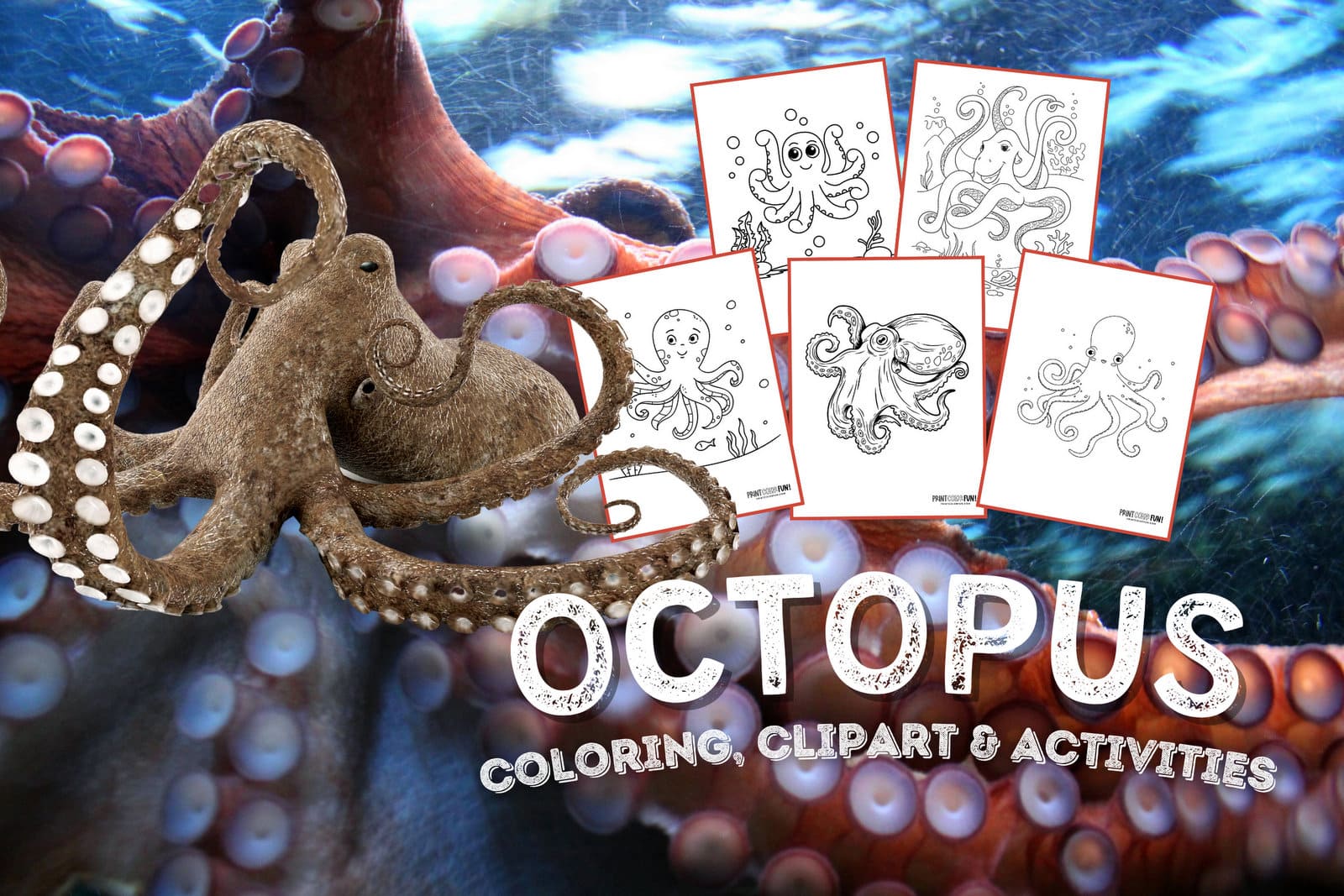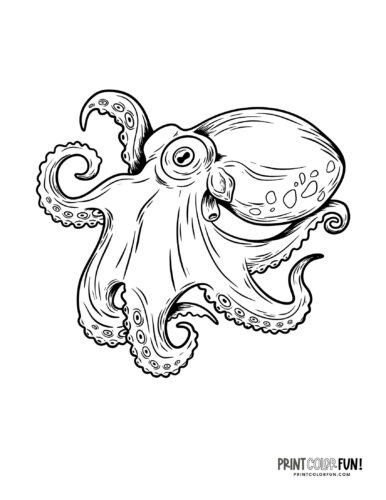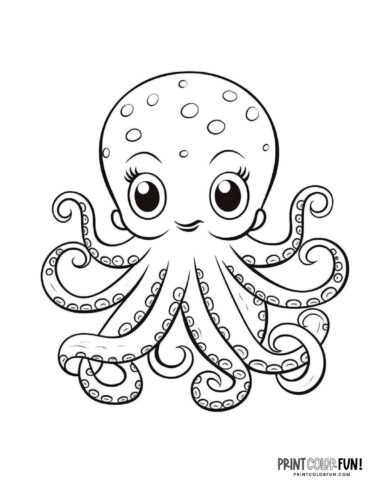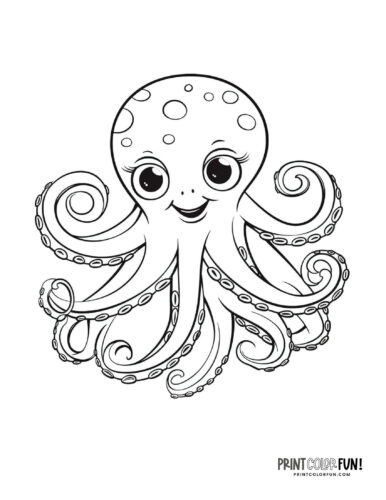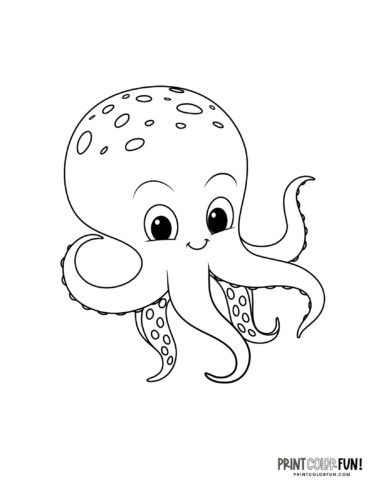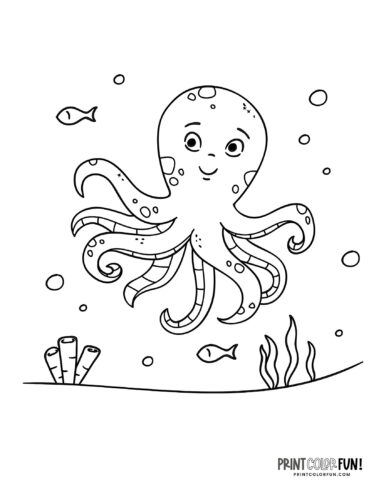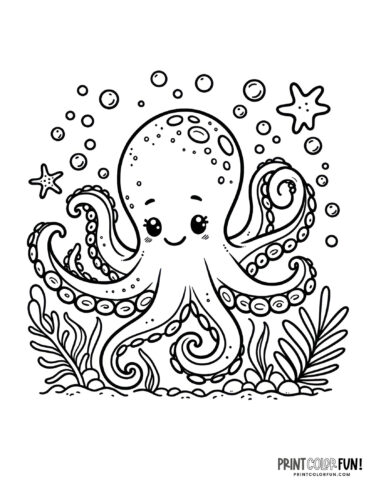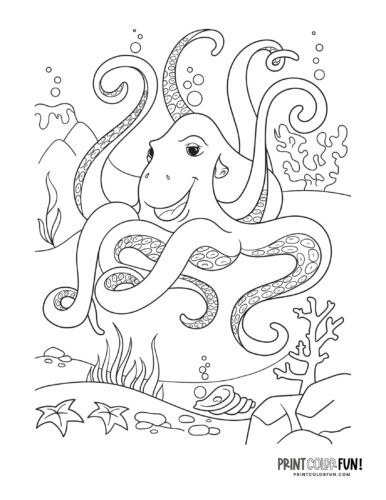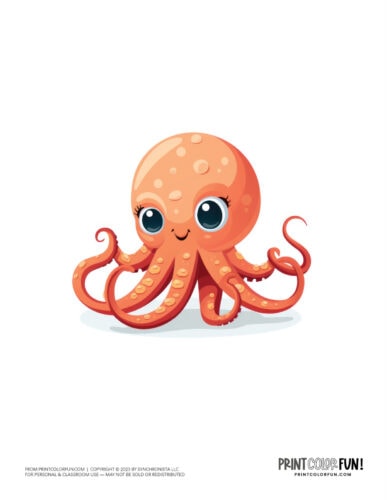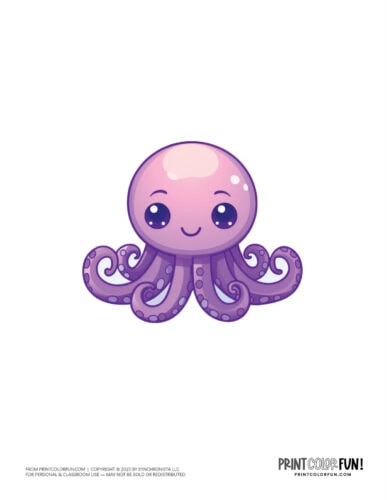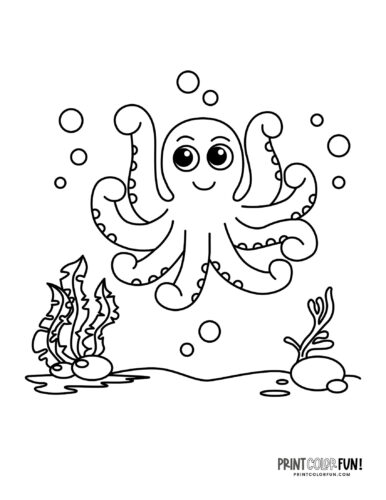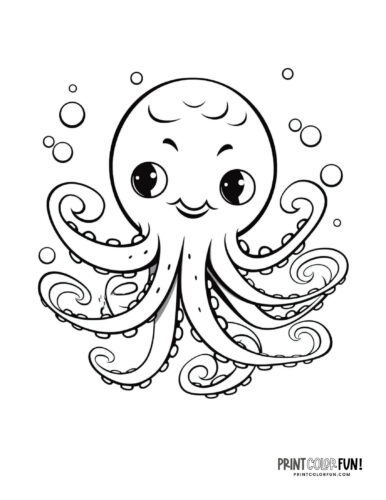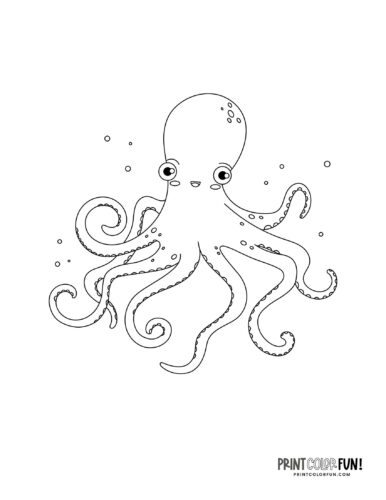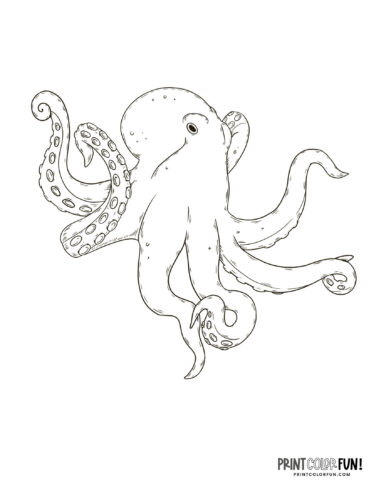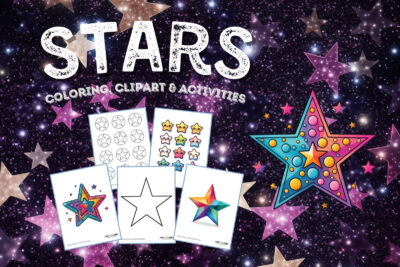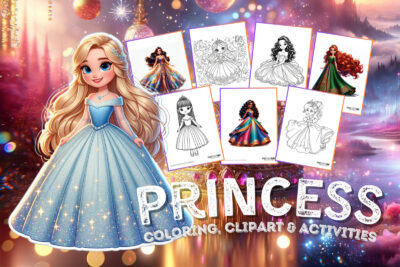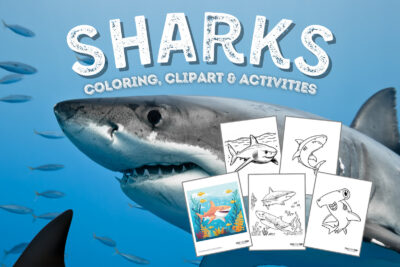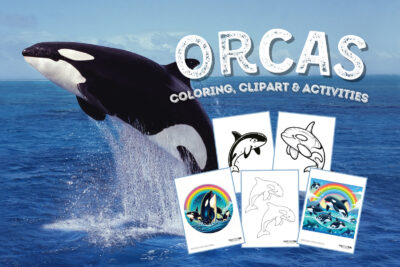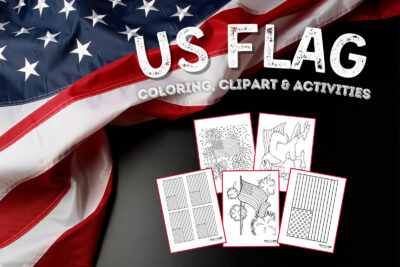Dive deep into the ocean depths with these octopus drawings
Octopuses fascinate us with their intelligence and unique abilities — making them a perfect subject for coloring and learning.
Our collection of octopus clipart invites you and your child to visit their intriguing underwater world. You’ll find pages featuring realistic depictions as well as cute cartoon-like illustrations, catering to every young artist’s preference.
(PS: Have you seen “My Octopus Teacher” yet? If not, you definitely need to check it out.)
What you'll find here
Toggle- Dive deep into the ocean depths with these octopus drawings
- Learn about the mysterious octopus
- 4 fascinating features of octopuses
- 10 fun octopus facts
- What's the difference between an octopus and a squid?
- Creative octopus crafts
- Engaging learning activities
- Octopus coloring page printables & clipart
- Books: Diving deeper into the octopus world
Learn about the mysterious octopus
The name “octopus” itself, deriving from Greek to mean “eight-foot,” highlights the most iconic feature of these eight-armed sea creatures.
Octopuses are cephalopods — a group of mollusks that also includes squids and cuttlefish. They are known for these eight arms lined with suction cups, which they use for various tasks like moving around, capturing prey, and even sensing their environment.
These sea creatures are masters of camouflage, able to change their skin color and texture to blend in with their surroundings — a fascinating fact that can inspire artwork and discussions with your child. They do this through special cells in their skin called chromatophores, which expand and contract to alter their appearance.
Octopuses also have a remarkable intelligence. They can solve puzzles, navigate through mazes, and even use tools, making them a subject of interest for scientists and children alike. When your child engages with octopus drawings and clipart, they’re exploring art while also connecting with a creature that’s a marvel of the natural world.
4 fascinating features of octopuses
Incredible camouflage
- How it works: Octopuses can change their skin color and texture, using chromatophores and iridophores in their skin for perfect camouflage during hunting or hiding.
- Mechanism: This process involves the expansion and contraction of pigment cells.
Diet and hunting
- Diet: Octopuses feast on crabs, snails, and small fish, using their beak-like mouths for cracking open shells.
- Hunting: They employ their arms for crawling and capturing prey, showing remarkable adaptability.

The wonders of tentacles
- Suction cups: Each arm is lined with suction cups that aid in sensing and capturing prey.
- Regeneration: Octopuses can regrow lost arms, showcasing their amazing resilience.
Octopus intelligence and behavior
- Cognitive skills: Known for their problem-solving abilities and use of tools, octopuses are smart sea dwellers.
- Escape artists: Their flexible bodies enable them to squeeze through tiny spaces, escaping predators or exploring.
- SPARK INTEREST: Turn your child’s natural fascination about animals into curiosity about the natural world with this educational ocean animal set
- ENCOURAGE: Inspire imaginative play and vocabulary development. This jumbo ocean animal set is the perfect introduction to the outdoors, animals, and a love of learning. Activity guide...
- DURABLE FUN: Made of lightweight, durable, dishwasher-safe plastic
- Durable plastic animals are sized just right for small hands and can be wiped clean
10 fun octopus facts
- Octopuses have three hearts — two of these pump blood to the gills, while the third heart pumps it to the rest of the body.
- They squirt ink as a defense mechanism to distract predators.
- Each of an octopus’s arms can act independently from the brain.
- Octopuses can taste with their arms, thanks to receptors on their suckers.
- The correct plural of octopus is octopuses (though octopi and octopodes are also used).

- They can regenerate lost arms.
- An octopus’s brain is shaped like a donut.
- Octopuses have blue blood due to a copper-based protein called hemocyanin.
- The smallest octopus species is about the size of a postage stamp.
- Some species of octopus can glow in the dark.
What’s the difference between an octopus and a squid?
When you’re exploring the wonders of marine life with your kids, distinguishing between an octopus and a squid can be a fun and educational experience. Both are fascinating cephalopods, but they have some key differences. Here’s a handy guide to help you and your little explorers understand the unique traits of these sea creatures:
Size and shape
- Octopus: Ranges from about 12 to 36 inches in length. Generally smaller and rounder, however, sizes can vary significantly among different species.
- Squid: Usually between 24 and 36 inches in length. Often larger and more elongated, but squid species vary widely in size. For instance, the Giant Squid can reach lengths of up to 43 feet, although this is far from the average!
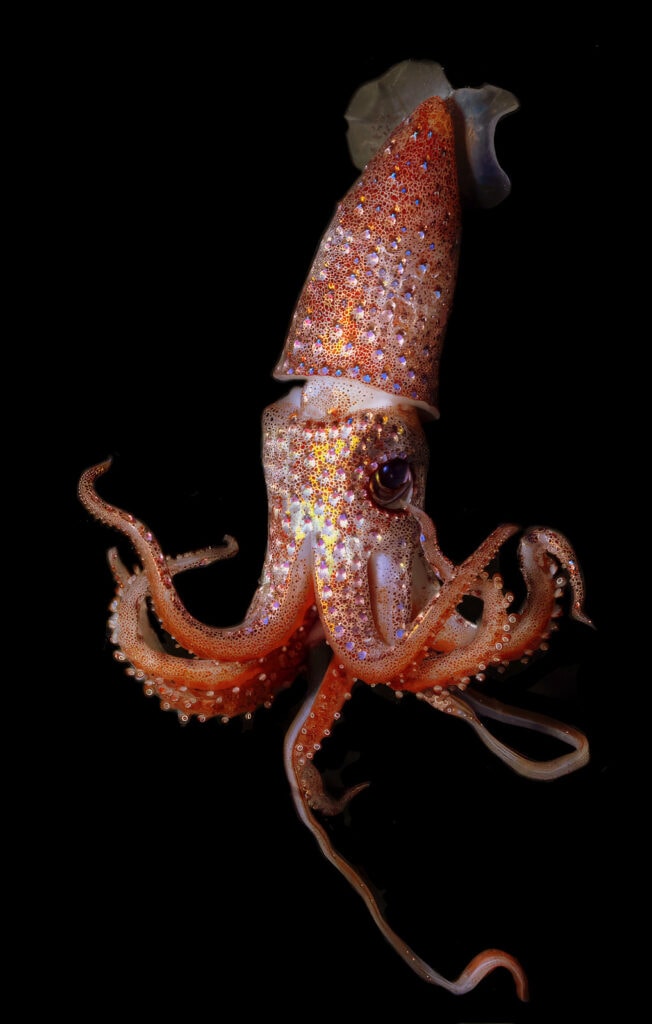
Arms and tentacles
- Octopus: 8 arms with suction cups
- Squid: 8 arms plus 2 longer tentacles
Movement
- Octopus: Crawls along the sea floor
- Squid: Propels through water with a jet-like motion
Habitat
- Octopus: Prefers to stay near the seabed, often in dens
- Squid: Lives in open waters, sometimes in groups
Defense mechanisms
- Octopus: Known for its ability to camouflage and eject ink
- Squid: Also ejects ink, but can move rapidly to escape predators
Food for humans
Both squid and octopus are consumed in various cuisines around the world. They’re appreciated for their unique textures and flavors, and are prepared in a multitude of ways.
Creative octopus crafts
Here are five crafts that bring octopus drawings and clipart to life, sparking creativity and learning.
- Octopus sock puppet: Transform a sock into an octopus puppet by attaching felt or fabric strips as tentacles. Glue or sew these at the toe end of the sock, and use markers or googly eyes to create the face. This craft allows children to explore octopus anatomy and movement in a playful way.
- Paper plate octopus: Cut the edges of a paper plate into eight sections for tentacles, leaving the center intact. Have your child color and decorate the plate, curling the tentacles to mimic an octopus. This activity is excellent for fine motor skills and understanding the octopus’s unique body structure.

- Tentacle headband: Create a fun headband with dangling tentacles. Cut colorful paper or ribbon strips and attach them to a headband. This simple craft can encourage role-playing and learning about how octopuses move.
- Octopus mobile: Use octopus printables to create an ocean-themed mobile. Cut out and color the octopus images, then attach them to a hanger using string or yarn at different lengths, simulating the floating movement of an octopus in water.
- Clay octopus model: Make a 3D octopus using modeling clay. Shape the body and create eight tentacles, adding texture with tools or fingers. This craft helps children understand the physical features of an octopus while honing their sculpting skills.
- Workman publishing-paint by sticker kids dinosaur
- Language: english
- Book - paint by sticker kids: under the sea: create 10 pictures one sticker at a time!
- Workman Publishing (Author)
Engaging learning activities
Incorporate these educational activities to deepen your child’s understanding and enjoyment of octopuses.
- Color and label: Use an octopus coloring page to identify and label different parts of the octopus, like the mantle, arms, and suckers. This activity combines art with anatomy, enhancing both creativity and scientific knowledge.
- Habitat diorama: Create a diorama of an octopus habitat using a shoebox, colored paper, and other craft materials. Include elements like seaweed, rocks, and small fish, encouraging your child to learn about where octopuses live and their environment.

- Octopus counting game: Use octopus images or clipart for a counting activity. Count the tentacles, practice addition or subtraction, and introduce simple math concepts in a fun and interactive way.
- Storytelling with art: Encourage your child to create a story using octopus clipart as characters. This activity promotes creativity, narrative skills, and an understanding of storytelling structure.
- Texture exploration: Using materials like play dough, fabric, and sponges, let your child explore and recreate the different textures of an octopus, such as its smooth skin and suction-cupped tentacles. This sensory activity enhances tactile learning and understanding of the creature’s physical characteristics.
Octopus coloring page printables & clipart
As you and your child color these pages, think about the sensations an octopus might feel through its tentacles or the ways it might blend into its environment. This coloring activity becomes a fusion of fun and education, sparking both imagination and curiosity about the natural world.
Books: Diving deeper into the octopus world
Books about octopuses can complement the visual learning from drawings and clipart. They offer detailed information, stories, and facts to further ignite your child’s interest in these fascinating sea creatures. Look for books that blend educational content with engaging narratives to make learning about octopuses an enjoyable and enriching experience.
- Guendelsberger, Erin (Author)
- English (Publication Language)
- 32 Pages - 05/01/2020 (Publication Date) - Sourcebooks Wonderland (Publisher)
- Drimmer, Stephanie Warren (Author)
- English (Publication Language)
- 48 Pages - 10/08/2019 (Publication Date) - National Geographic Kids (Publisher)
- Reads, Animal (Author)
- English (Publication Language)
- 76 Pages - 01/19/2023 (Publication Date) - Admore Publishing (Publisher)
- Hardcover Book
- Bently, Peter (Author)
- English (Publication Language)
- 32 Pages - 08/23/2022 (Publication Date) - Candlewick Press (Publisher)
- Hardcover Book
- Towler, Paige (Author)
- English (Publication Language)
- 48 Pages - 03/19/2024 (Publication Date) - National Geographic Kids (Publisher)

